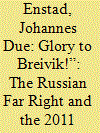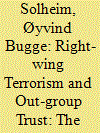| Srl | Item |
| 1 |
ID:
156903


|
|
|
|
|
| Summary/Abstract |
This article documents Anders Behring Breivik's reception on the Russian far Right, with a comparative view to Western Europe. On July 22, 2011, Breivik carried out two terrorist attacks in Norway, killing 77 people. Based on a variety of open sources, the article finds that Breivik has received much more open support in Russia than in Western Europe. I suggest there are three main reasons why Russia stands out. First, a weaker social stigma attached to Right-Wing extremism reduces the cost of publicly embracing Right-Wing terrorists. Second, higher levels of violence in Russian society increase desensitization and violence acceptance. Third, the embrace of Breivik fits into a vibrant tradition of iconizing Right-Wing militants on the Russian far Right. The article highlights Russia as a hotspot of Right-Wing extremist activism in Europe. It also provides insights that may prove useful in future comparative research on cross-national variation in Right-Wing violence and terrorism.
|
|
|
|
|
|
|
|
|
|
|
|
|
|
|
|
| 2 |
ID:
175717


|
|
|
|
|
| Summary/Abstract |
Terrorist attacks often lead to public backlashes. Following the attacks on July 22, 2011 in Norway, Norwegians showed support for democratic values such as “openness,” “democracy,” and “tolerance” in the public debate and in the commemorations across the country. They also reported higher out-group trust. This paper explores two possible reasons for this increase in trust using a unique panel fielded before and right after the attacks. The first is that cognitive dissonance led people to dissociate from the terrorist and his ideology. The second is that the increase in trust was a response to the public backlash after the attacks. The increase in trust was not caused by cognitive dissonance. Rather, people who were already positive towards immigration, or who saw positive effects of the attacks, became more trusting than others did, and Progress Party supporters increased their trust less than others. These findings are interpreted as a response to the attacks and the political characteristics of the backlash. The study concludes by discussing implications for our understanding of the different consequences of attacks for the terrorists’ imagined constituencies and for the broader public.
|
|
|
|
|
|
|
|
|
|
|
|
|
|
|
|